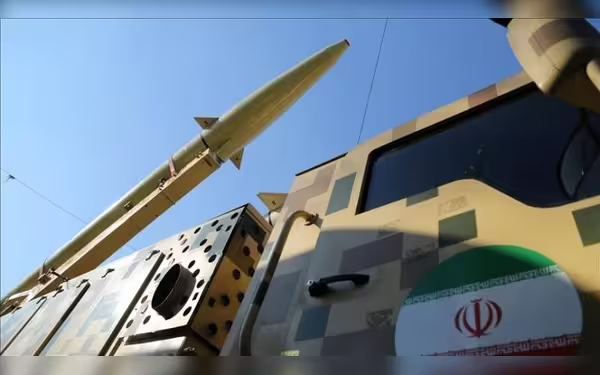Saturday, November 16, 2024 08:25 PM
US, UK Express Alarm Over Iran's Arms Supply to Russia
- US and UK condemn Iran's lethal weapons transfer to Russia.
- Biden and Starmer reaffirm commitment to Ukraine's defense.
- Concerns raised over Iran-North Korea arms collaboration.
 Image Credits: nation_pk
Image Credits: nation_pkUS and UK leaders express concern over Iran supplying lethal weapons to Russia, reaffirming support for Ukraine amid ongoing global tensions.
In recent developments, the United States and the United Kingdom have raised alarms regarding Iran's provision of lethal weapons to Russia. This concern was articulated by US President Joe Biden and British Prime Minister Keir Starmer during their meeting at the White House. The leaders emphasized their steadfast support for Ukraine as it continues to defend itself against Russian aggression.
The White House issued a statement highlighting the leaders' deep worries about the collaboration between Iran and North Korea in supplying lethal arms to Russia. Additionally, they expressed apprehension about the People's Republic of China's support for Russia's defense industrial base. This meeting was not just about weapons; it also covered a range of pressing global issues.
During their discussions, Biden and Starmer reiterated their "ironclad commitment" to Israel's security. They stressed the urgent need for a cease-fire deal that would not only free hostages but also allow for increased humanitarian relief in the Gaza Strip. The leaders called for Israel to take more measures to protect civilians and address the dire humanitarian situation in the besieged enclave.
Moreover, they condemned the Houthi attacks on commercial shipping in the Red Sea, showcasing their commitment to maintaining international maritime security. The conversation also touched on U.S.-UK cooperation in clean energy and advanced technologies, as well as the AUKUS partnership involving Australia, the UK, and the US. President Biden reaffirmed his support for the Belfast/Good Friday Agreement, which plays a crucial role in ensuring peace and stability in Northern Ireland.
In a concerning revelation, the US previously reported that Iran had transferred shipments of Fatah-360 close-range ballistic missiles to Russia. The Pentagon described this development as "deeply concerning," as it could lead to increased civilian casualties in Ukraine. In response, the Kremlin stated that Russia would react "appropriately" if the US lifted restrictions on Ukraine's use of American-supplied missiles to strike targets within Russia.
As the meeting unfolded, Biden was questioned by reporters about Ukraine's interest in using long-range missiles to target deep within Russia. He responded, "We’re going to discuss that now," indicating that the topic was on the agenda. However, the White House later clarified that there has been no change in US policy regarding the use of long-range missiles by Ukraine inside Russia. National Security Council spokesman John Kirby reiterated, "There is no change to our view on the provision of long-range strike capabilities for Ukraine to use inside of Russia."
This ongoing dialogue between the US and UK underscores the complexities of international relations in the face of conflict. As nations navigate these turbulent waters, the implications of arms transfers and military support will continue to shape the geopolitical landscape. The situation remains fluid, and the world watches closely as these developments unfold.













